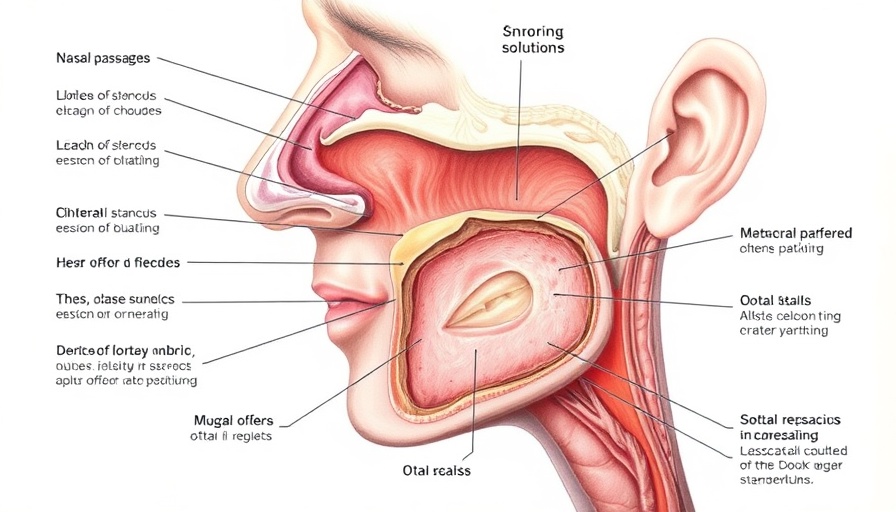
Understanding Snoring: The Science Behind It
Snoring is more than just a disruptive nighttime noise; it's a sign of potential health issues that can affect anyone, including kids. As parents, knowing about the reasons behind snoring can lead to better sleep for your family. Approximately 57% of moderate snorers experience benefits from treatment, making it essential to address these concerns early on.
Anatomical Solutions: How They Work
Many factors can contribute to snoring, including the anatomy of the airway. Relaxed throat muscles, enlarged tonsils, or nasal obstructions can lead to vibrations during sleep, creating that infamous snoring sound. Simple changes such as changing sleeping positions or utilizing nasal strips can improve airflow and reduce snoring.
The Importance of Sleep Quality
When it comes to sleep health, quality is just as critical as quantity. Poor sleep quality can lead to daytime fatigue, affecting productivity and mood. For parents, teaching children about sleep hygiene is vital. Encouraging regular bedtime routines and creating a conducive sleep environment can enhance sleep quality for everyone.
Shifting Perspectives: Urban and Rural Sleep Patterns
Interestingly, sleep patterns can vary significantly between urban and rural areas. Urban environments often present challenges such as noise pollution and light exposure, leading to shorter sleep durations and increased sleep disorders among city dwellers. Understanding these differences can help parents manage their children's sleep environment better.
What Parents Can Do: Practical Tips for Better Sleep
As parents, it's crucial to create a healthy sleep environment. This includes factors like temperature regulation, choosing the right bedding, and limiting screen time before bed. Introducing relaxation techniques such as bedtime stories and soft music can also help children ease into sleep. These methods contribute to improved sleep and also foster a positive sleep culture within the family.
The Impact of Healthy Sleep on Growth and Development
Good sleep isn't just about comfort; it's essential for growth and development. Sleep plays a vital role in how children learn, grow, and even their overall mood. For instance, studies show that children who have sufficient sleep perform better academically and socially. As parents, prioritizing sleep can significantly influence your child's health and success.
Long-term Strategies for Sleep Health
Ensuring that children understand the value of sleep can set the foundation for lifelong habits. Incorporating educational discussions about sleep and its benefits into family conversations can empower kids. Letting them know the impact of sleep on their health will encourage them to take responsibility for their rest.
Conclusion: Prioritizing Sleep in Your Family
By addressing snoring and promoting good sleep hygiene, parents can help their children enjoy more restful nights. This not only has immediate benefits but also positively effects their long-term health. As you navigate sleep challenges in your family, remember that sleep education is as vital as any other life lesson. Take action today to promote better sleep, and watch as your family thrives. Invest in sleep awareness programs, and continue researching effective solutions for sleep disorders.
 Add Row
Add Row  Add
Add 




Write A Comment